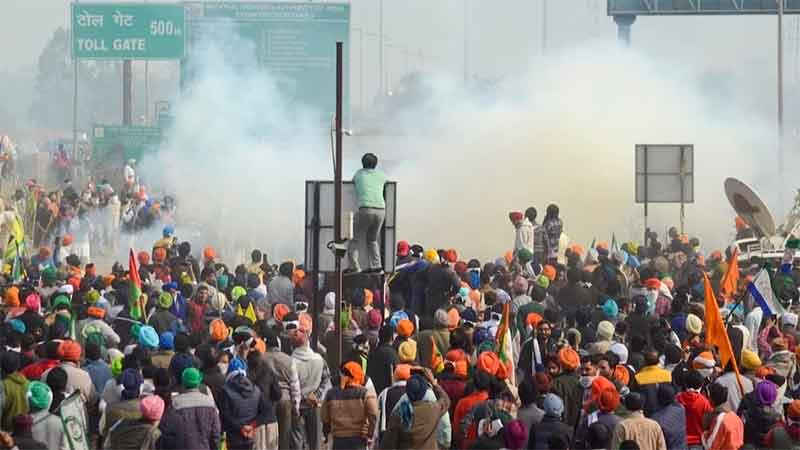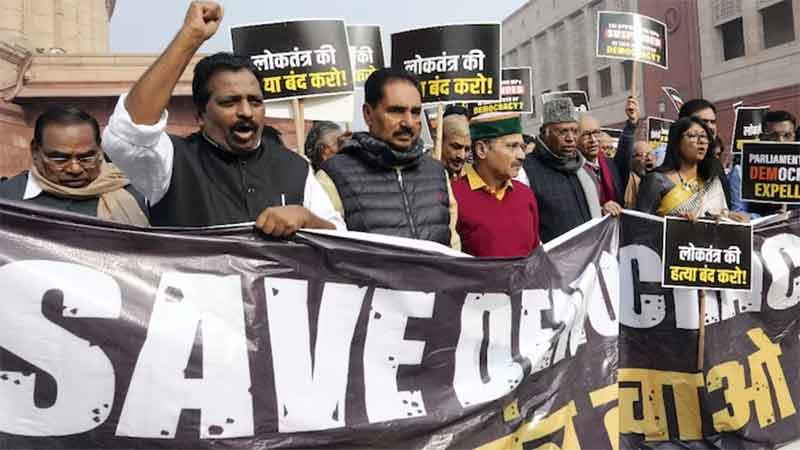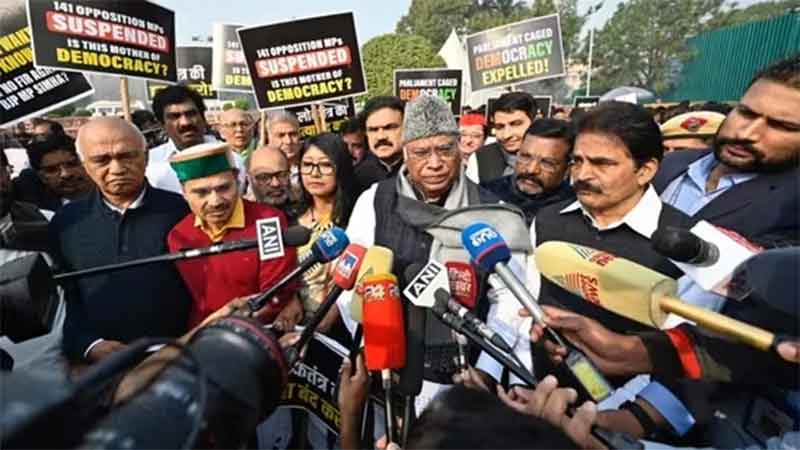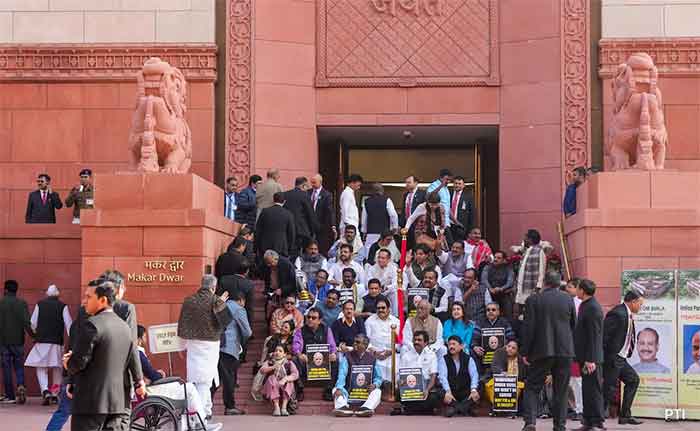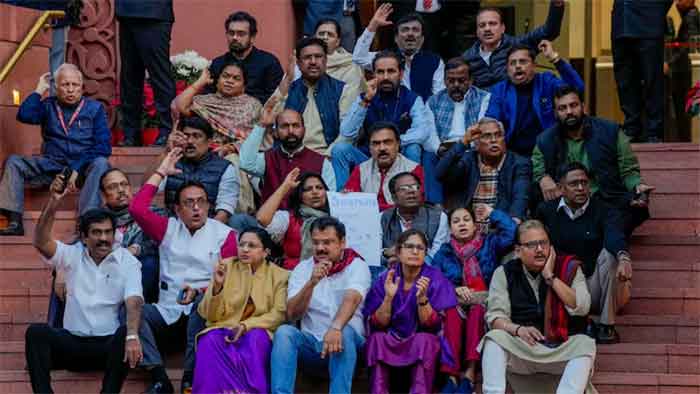
How ironical is it that the excuse given for having a new Parliament building was that the capacity of the old one could not be extended to meet the needs of today, and yet there are close to a hundred MPs (92 to be exact, as of writing) that have been thrown out (suspended) from Parliament in this Winter Session?
Has the evisceration of formal Indian democracy reached a point where the basic legitimacy of the electoral process and its outcomes are now under question? And how long do we have before even asking this question can spell trouble for journalists, writers, publishers, and common citizens?
It has often been rightly said that democracy in India is limited to the choreography of electioneering and power-brokering of the agents of the ruling castes and classes while society continues to remain undemocratic and dangerously authoritarian on an individual, familial, and social level. It now seems like even the thin crust of formal democracy with its procedures, grand buildings, official posts, and ponderous Constitution is crumbling quickly.
With a total of 92 MP’s suspended from Parliament this Winter Session, and the brazen expulsion of Mahua Moitra and Rahul Gandhi (now reinstated) in the recent past, it is becoming clear that the institution of the Parliament itself is being reduced to a rubber-stamp and the legitimacy and peace-keeping nature of electoral power transfers are being threatened. It does not need much explaining as to why this is dangerous and portends a destabilizing effect on the polity of the country. Parliament is becoming the personal fiefdom of one man and his coterie rather than a place where the real living and breathing people of this country with all their hopes and problems are represented and governed through laws enacted with consensus.
Do election results mean nothing?
A rumble of dissatisfaction is emerging from the ground level and the role of Electronic Voting Machines (EVMs) is now being openly doubted. This is not a new trend and muted opposition to the use of EVMs and a call for returning to ballot paper elections has always existed in niche corners, but is shouted down by aggressive pro-government voices saying that it is nothing but complaints from sore losers now that the people have supposedly rejected ‘corruption’ and opted for ‘development’ (i.e., constant upper-caste ‘Hindu’ appeasement, fascist violence, etc.).
But the anti-EVM sentiment has been boosted in recent times in tandem with the BJP’s brazen moves to disregard the procedures, outcomes, and the concept of fair elections itself. Such a situation has created justified doubts on whether the election results themselves are fair or a result of machine manipulation. The technical debates on whether the machines are invulnerable (I don’t think they are) aside, the real issue is that the overall messaging of the government is a complete intolerance for dissent against or limits on its power which makes it fair to assume that it will maintain tight control of all nodes through which the transfer of power occurs: voting machines, the Election Commission, media apparatus, bureaucracy, civil society, and the judiciary.
Put simply, a ruthless authoritarian regime is expected to tightly control all the levers of power, and election results are blunt weapon which they have consistently used to justify abuses and overreaches of power.
The RSS and BJP see themselves on an ideological and civilizational mission in which short-term power and long-term transformation and conquest of the land are not only compatible but necessary. There is no space for power sharing, consensus building, checks-and-balances, or institutional oversight that liberal democracy needs to be able to temper the exercise of popular will with democratic guarantees and protections. Theirs is a politics of conquest, destruction-as-spectacle, and forceful remaking (and renaming). It takes what existed before it and stamps its own image on it, such as the jacking up of the Ashoka Lions into ferocious monstrosities or the putting out of the Amar Jawan Jyoti. The bulldozer is not only their weapon of choice against the poor and helpless but an entire metaphor for their political vision and cultural worldview.
The Modi-led BJP has repeatedly grabbed power in states where the popular mandate was not given to it. This was a common template in all the so-called ‘political crises’ of various states drummed up by the media in their headlines, dressing up a naked power-grab as something else. As a recent example, the Supreme Court itself acknowledged that the Governor of Maharashtra asking the Maha Vikas Aghadi (MVA) government leader Uddhav Thackeray to prove his majority in the House was illegal, but stopped short of applying the term to the successor government of Eknath Shinde, saying that “However, the status quo ante cannot be restored because Thackeray did not face the floor test and tendered his resignation”.
Delhi-controlled Governors are being sent to states that are outside the political and socio-cultural influence of the BJP in order to hamstring legitimate elected governments and creating a wider wave of public support for their ouster. The Tamil Nadu Governor sitting on Bills despite being sent to him a second time, or the Kerala governor openly claiming that Constitutional machinery has broken down in the state, are clear indications that New Delhi sees States as junior partners and will not tolerate insubordination, regardless of what the Constitution says about federalism.
Chief Election Commissioner now under Govt thumb?
With the passage of the Chief Election Commissioner and Other Election Commissioners (Appointment, Conditions of Service and Term of Office) Bill, 2023 in the Rajya Sabha (and very soon in the Lok Sabha), the government has nullified the Supreme Court judgement earlier this year in March and excluded it from the process of selection the Chief Election Commissioner (CEC). Chapter 2.7 of the Bill says that the CEC will be selected by the Prime Minister and one Cabinet Minister nominated by him, essentially cementing his decision by having two votes in the procedure. This is a clear violation of the independence of the CEC and paves the way for the capture of the institution and the electoral process itself.
Making opposition impossible
Any meaningful opposition to government policies has only materialized in the form of grassroots popular mobilizations, such as the anti-CAA, NRC protests of 2019 and the farmers’ protests of 2021. These cannot be claimed by any ‘mainstream’ political party in the Opposition. This is a sign that representative institutions are losing their connect with the people’s needs and that the electoral process is unable to represent and contain the true aspirations of the people due to the political constraints of the players in the ‘game’.
The total failure of India’s deeply flawed democracy appears inevitable now that the outermost façade, i.e., ‘free and fair elections’ at the slightest touch of the Great Leader’s finger pointing towards the Amrit Kaal (Golden Age). All the trappings of the brute force of the Hindutva Right are on full display: jailing political opponents on flimsy grounds and without charges, disrespecting the popular mandate and grabbing power, creating legitimate doubts on the electoral process, making the Election Commission and Supreme Court pliant and docile, using the military to create populist spectacles (like Surgical Strike or the Agniveer scheme), using proxies and agents like Governors to impede rival political parties in power, and more.
As a socialist and Marxist, this is a sad yet necessary vindication of the inevitable failure of bourgeoise-controlled parliamentary democracy to truly defend the people when they need it the most against ascendant fascism and degrading economic conditions. Should the ‘mainstream’ political opposition go directly to the people now and boycott elections altogether, or is it too extreme a step just yet? Hopefully, we will have the answer just a few months down the line when 2024 comes around as perhaps the most pivotal year in post-independence India.
Arjun Banerjee is a political commentator

